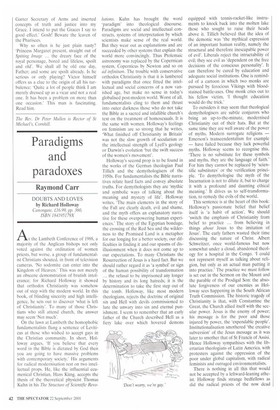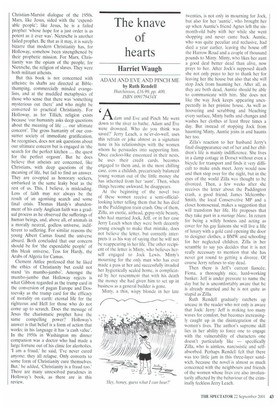Paradigms and paradoxes
Raymond Carr
DOUBTS AND LOVES by Richard Holloway Canongate. £16.99, pp. 360, ISBN 184195I79X At the Lambeth Conference of 1988, a majority of the Anglican bishops not only voted against the ordination of women priests, but worse, a group of fundamentalist Christians shouted, in front of television cameras, 'No sodomite can enter into the Kingdom of Heaven. This was not merely an obscene demonstration of brutish intolerance; for Richard Holloway it showed that orthodox Christianity was somehow out of step with the modern world. In this book, of blinding sincerity and high intelligence, he sets out to discover 'what is left of Christianity'. To many of those Christians who still attend church, the answer may seem 'Not much'.
On the lawn at Lambeth the homophobic fundamentalists flung a sentence of Leviticus at those who wished to accept gays in the Christian community. In short, Holloway argues, 'If you believe that every word in the Bible is dictated by God then you are going to have massive problems with contemporary society.' His arguments for radical modernisation rest on two intellectual props. He, like the influential ecumenical Christian. Hans Ming, accepts the thesis of the theoretical physicist Thomas Kuhn in his The Structure of Scientific Rem
lutions. Kuhn has brought the word 'paradigm' into theological discourse. Paradigms are social and intellectual constructs, systems of interpretation by which scientists make sense of the real world. But they wear out as explanations and are succeeded by other systems that explain the world more convincingly. Thus Ptolemaic astronomy was replaced by the Copernican system, Copernicus by Newton and so on ad infinitum. The trouble with conservative orthodox Christianity is that it is lumbered with paradigms that once fitted the intellectual and social concerns of a now vanished age, but make no sense in today's globalised post-modern world. Worst of all, fundamentalists cling to them and thrust into outer darkness those who do not take the Bible as a sacred and infallible church's text on the treatment of homosexuals. It is the same with women. Holloway's feelings on feminism are so strong that he writes, 'What finished off Christianity in Britain' was not the slow growth of secularism or the intellectual strength of Lye11's geology or Darwin's evolution 'but the swift success of the women's movement'.
Holloway's second prop is to be found in the works of the German theologian Paul Tillich and the demythologisers of the 1950s. For fundamentalists the Bible narratives relate hard facts and convey absolute truths. For demythologists they are 'mythic and symbolic ways of talking about the meaning and mystery of life'. Holloway writes, 'The main elements in the story of the Fall are clearly death, evil and shame, and the myth offers an explanatory narrative for these overpowering human experiences.' The story of the Egyptian bondage, the crossing of the Red Sea and the wilderness to the Promised Land is a metaphor for our longing for a better society, our difficulties in finding it and our spasms of disillusionment when it does not come up to our expectations. To many Christians the Resurrection of Jesus is a hard fact. But we should rather regard it as 'a symbol' or sign of the human possibility of transformation ... the refusal to be imprisoned any longer by history and its long hatreds; it is the determination to take the first step out of the tomb. Holloway, like most modern theologians, rejects the doctrine of original sin and Hell with devils commissioned to lure the unwary into sin and eternal punishment. I seem to remember that an early father of the Church described Hell as a fiery lake over which hovered demons
equipped with tennis-racket-like instruments to knock back into the molten lake those who sought to raise their heads above it. Tillich believed that the idea of the demonic was 'the mythical expression of an important human reality, namely the structural and therefore inescapable power of evil'. Liberals reject the intractability of evil; they see evil as 'dependent on the free decisions of the conscious personality'. It can therefore be cured by education and adequate social institutions. One is reminded of a cartoon in which two monks are pursued by ferocious Vikings with bloodstained battle-axes. One monk cries out to his fellow victim, 'I thought education would do the trick.'
To outsiders it may seem that theological demythologisers are subtle conjurors who bring an up-to-the-minute, modernised Christianity out of their hats. But at the same time they are well aware of the power of myths. Modern surrogate religions — Emerson's transcendentalism for example — have failed because they lack powerful myths. Holloway seems to recognise this. 'There is no substitute for these symbols and myths, they are the language of faith.' For him they cannot be replaced by 'scientific substitutes' or the verification principle. 'To demythologise the myth of the Incarnation is not to dilute it, but to charge it with a profound and daunting ethical meaning.' It drives us to self-transformation, to remedy the evils of the world.
This sentence is at the heart of this book: Holloway's passionate belief that belief itself is 'a habit of action'. We should 'switch the emphasis of Christianity from belief to practice ... from believing in things about Jesus to the imitation of Jesus'. The early fathers wasted their time discussing the nature of Christ. Albert Schweitzer, once world-famous but now somewhat under a cloud, abandoned theology for a hospital in the Congo. I could not represent myself as talking about religion, but only as an actual man putting it into practice.' The practice we must follow is set out in the Sermon on the Mount and the parable of the Prodigal Son: the absolute forgiveness of our enemies as Holloway sees happening in the South African Truth Commission. The historic tragedy of Christianity is that, with Constantine the Great, the Church allied itself with the secular power. Jesus is the enemy of power; his message is for the poor and those injured by power, the 'expendable people'. Institutionalisation smothered 'the creative subversion' of the Jesus message as it was later to smother that of St Francis of Assisi. Hence Holloway sympathises with the libertarian theologians of Latin America, with protesters against the oppression of the poor under global capitalism, with radical feminists and outraged environmentalists.
There is nothing in all this that would not be accepted by a leftward-leaning atheist. Holloway finds strange bedfellows as did the radical priests of the now dead Christian-Marxist dialogue of the 1950s. Marx, like Jesus, sided with the 'expendable people'; like Jesus, he is a failed prophet 'whose hope for a just order is as potent as it ever was'. Nietzsche is another failed prophet. Be that as it may, it is surely bizarre that modern Christianity has, for Holloway, somehow been strengthened by their prophetic mission. For Marx, Christianity was the opium of the people; for Nietzsche, the religion of slaves. They were both militant atheists.
But this book is not concerned with atheists; its shafts are directed at Biblethumping, commercially minded evangelists, and at the muddled metaphysics of those who sense that there was 'something mysterious out there' and who might be converted to practical Christianity. For Holloway, as for Tillich, religion exists because 'our humanity asks deep questions about the meaning of life ... our ultimate concern'. The gross humanity of our consumer society of immediate gratification, he recognises, does not ask questions about our ultimate concern but is engaged in 'the search for the perfect kitchen ... the quest for the perfect orgasm'. But he does believe that atheists are concerned, like Christians, with deep questions of the meaning of life, but fail to find an answer. They are co-opted as honorary seekers, embarked in the same leaky boat as the rest of us. This, I believe, is misleading. Loss of faith may not always be the result of an agonising search and some final crisis. Thomas Hardy's abandonment of his early Anglican faith was a gradual process as he observed the sufferings of human beings, and, above all, of animals in a morally neutral, godless universe, indifferent to suffering. For similar reasons the young Albert Camus found the universe absurd. Both concluded that our concern should be for 'the expendable people' of this bleak universe. Tess for Hardy, the Arabs of Algeria for Camus.
Clement Attlee professed that he liked the ethics of Christianity but could not stand 'its mumbo-jumbo'. Amongst the mumbo-jumbo that Holloway rejects is what Gibbon regarded as the trump card in the conversion of pagan Europe and Dostoevsky as the trump card for the efficacy of morality on earth: eternal life for the righteous and Hell for those who do not come up to scratch. Does the message of Jesus the charismatic prophet have the same compelling power? Holloway's answer is that belief is a form of action that works; in his language it has 'a cash value'. In the 1950s in Washington my dinner companion was a doctor who had made a large fortune out of his clinic for alcoholics. 'I am a fraud,' he said, 'I've never cured anyone; they all relapse. Only converts to some form of Christianity cure themselves. But,' he added, 'Christianity is a fraud too.' There are many unresolved paradoxes in Holloway's book, as there are in this review.











































































 Previous page
Previous page